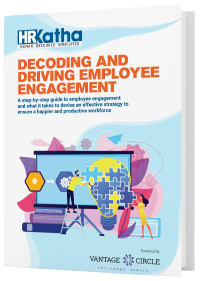Soft Skills In The Workplace- What HR Leaders Should Know?

Soft skills, also known as "interpersonal" or "people skills," are essential for day-to-day interactions both inside and outside the workplace, and they complement technological or hard skills. Soft skills refer to how people connect, listen, participate in conversations, provide input, work as part of a team, solve problems, and resolve disputes.
They are a collection of positive characteristics and abilities that can increase job performance and efficiency, improve relationships, and make a person more marketable in the workplace.
Soft skills in the workplace typically deal with interpersonal interaction—basically, communicating well with others and maintaining a positive attitude about the job and work environment. It includes skills such as communication and active listening, conflict resolution, constructive partnerships, teamwork and cooperation, personality, humility, openness to feedback, displaying strong levels of emotional intelligence. These abilities are more important to your personality than your academic or professional credentials.
According to 92 percent of talent acquisition practitioners in LinkedIn's Global Talent Trends report, soft skills are equally or more important to recruit for than hard skills. And, according to 89 percent of respondents, when a new recruit doesn't work out, it's due to a lack of essential soft skills.
When it comes to HR, soft skills in the workplace are critically essential. Although HR practitioners are required to recognize and adopt HR practices and regulations, it is also critical that they have the requisite soft skills to succeed in the field.
Read our blog on: 7 HR Practices Your Business Needs To Put In Place
The Top 8 HR Soft Skills In The Workplace
1. Proactivity skills
Proactivity is a personality attribute rather than a skill. It is, however, something that we can learn over time. As an HR professional, you are the link between the employer and the employee. Being proactive will assist you in identifying possible issues early and preventing them from worsening. Proactive HRM aids in the planning and aligning core HR activities to provide the most benefit to the business.
2. Confidentiality skills
HR departments handle sensitive employee information such as salaries. They are also aware of personal issues concerning staff members. It's important to place value and protect such critical security details. HR practitioners must develop the following skills to ensure that they protect privacy:
Ethics: Members of the HR department have access to organizational data such as contract terms, budgets, wages, and offer letters. It's important that they don't discuss or mention such data unnecessarily and retain their integrity at all times.
Confidence- HR professionals must inculcate confidence in their employees. Employees who disagree with a company policy or have a problem with their boss should contact Human Resources. They must, however, feel confident that raising a concern would not jeopardize their jobs.
Self-control - Disclosing an employee's personal information (such as medical history) can place the employee in an awkward position while also increasing the company's legal risks. Great HR professionals treat confidential information with respect. As research says, self control is one of the top soft skills in the workplace that employers look for.
3. Flexibility skills
Unexpected events (such as a resignation) can throw not only the HR's but also the team's schedule into a mess. HR team members must build the following skills to adapt to or even anticipate changes:
-
Change management- To keep up with industry trends and expectations, businesses must evolve. HR is frequently in charge of these projects, so you must be adaptable. HR is all about going forward, from collaborating with the management team to develop new policies — and assisting workers
in adjusting to them — to identifying and introducing new perks to attract and retain employees. To be competitive in this industry, you must be able to accept change. You should be able to tell when it's time to amend strategies, when it's time to build new ones, and how to help workers accept change (e.g., assisting employees in transitioning into new roles.) -
Self-evaluation and development- Never get too comfortable in the workplace if you want to keep it safe. HR workers with an improved attitude will help keep the workplace modernized with better employee engagement (for example, by incorporating creative rewards and recognition ideas)
-
Think about the big picture- HR practitioners are corporate associates who contribute to strategic planning and decision-making. They must be able to predict the future and act accordingly. As your company expands, it can make sense for HRs to invest in current employees by developing and implementing career path programs.
4. Sharing skills
HR should include some key soft skills to understand employees better and ideas for developing them. They can help the employees improve their own soft skills in the workplace.
Knowledge is a wealth; the more you distribute/ share, the more you gain.
You are fortunate and in an extraordinary place in the HR profession because you can help people grow. You can help them advance in their careers. You can improve their lives. You can assist them in altering their mindset and behavior. You can train them to be competitive in their future endeavors. Thus, HR has a vital and significant part in sharing, developing, coaching, and mentoring coworkers.
5. Clarity of thoughts
We have two choices in most scenarios and circumstances: either we want to do it or we don't want to do it; either we consent to it, or we don't consent to it; either it is acceptable, or it is not acceptable; either you want, or you don't want it. Many HR professionals seem to be puzzled when it comes to making choices. They remain unsure of their role within the organization and don't have any specific expectations from themselves and their team. Due to their uncertainty, they cannot make decisions. And until they don't have clarity of thoughts before their actions, they cannot take the right path. When analyzing problems like a conflict or crisis (such as layoffs), HRs should use sound reasoning, evaluate potential options and take effective action.
Also Read: Laying Off An Employee During Covid: A Quick Guide
6. Recognizing skills
Leaders and managers are not required to be buddies with their staff or coworkers, but they must be courteous. Having friendly relationships with coworkers and team makes work more fruitful and efficient.
To strengthen relationships and build a stronger bond:
-
Say something else than "hello."
Greetings aren't enough. It's often necessary to get down to the main point – a mission, a deadline, a critical issue, and so on. Similarly, it's important to display empathy and concern towards the employees when the situation arises. Ask about something that interests your colleagues rather than a generic "How are you?" -
Demonstrate gratitude
Thank staff and coworkers for their efforts. Don't wait until the completion of a project or annual evaluations. You can also express gratitude for the little things they bring to the table, such as a good sense of humor, a keen eye for mistakes, a spotless workstation, and a positive attitude. -
Recognize feelings
Work and life are emotional roller coasters. Leaders don't have to respond to every high and low, but they should fix the ones they notice. For example, "You seem irritated and nervous lately. Is there anything I can do to help?" -
Pay attention
Actively listen to your employees. Enable them to express their concerns and ideas in a variety of ways. Offer them a platform at department meetings, schedule one-on-one sessions regularly, set up a employee feedback box or an anonymous email account for submissions, and so on.
Read our blog on: 360 Degree Feedback: Definition, Benefits, Alternatives
- Be fair
Being fair is one of the most needed soft skills in the workplace. Unfair treatment is one of the worst things that can happen to a company's morale. HR must not turn a blind eye to wrong results or play favorites while rewarding and recognizing. It's best to keep track of what has happened in response to good and poor conduct so that leaders can have a reference solution if the problem occurs again.
7. Problem-solving skills
This old saying still holds true,
Don't just bring me a problem, bring me a solution.
We always expect HRs to express their thoughts about how to solve problems. But it's not only their burden to uphold. HR experts must serve as investigators when solving problems. They must delve deep into the issue, ask probing questions, gather information, examine, draw conclusions, and take corrective action.
8. Detail-oriented and reasoning skills
Being detail-oriented is essential in this line of work. One may reveal small but essential information if you review a candidate's references in detail. You must go above and beyond to gather — or provide — information that paints a complete picture of an individual or circumstance.
How Do You Go About Perfecting Your Soft Skills In The Workplace?
The truth is that our lives and experiences provide the foundation for soft skills growth. Parenting, for example, fosters self-awareness, time management, and dynamic problem-solving abilities. Similarly, confidentiality, adaptability, and problem-solving skills are typically acquired as you gain expertise in your field.
Thus, to develop your soft skills, read books or take training courses on negotiation and persuasion, critical listening, empathy, and conflict management. You can also attend public speaking masterclasses or seek guidance from your colleagues in the company.
Team building activities can have a significant impact on your ability to collaborate effectively. It's also beneficial to get to know and enjoy your coworkers. When it comes to displaying your leadership qualities, gaining your coworkers' confidence and approval can help.
Due to the lockdown, every employee has gained certain soft skills such as self-determination, resilience, and empathy. The way we work has changed dramatically, pushing us to adopt new habits, new ways of interacting with coworkers, and emphasizing the importance of soft skills.
Employers are constantly demanding to find candidates with soft skills, and it will be highly critical to surviving in a competitive job market in the aftermath of Covid-19. Isn't it the right time you added some soft skills to your resume?

Vantage Circle is a simple AI-powered Rewards & Recognition Platform for upgrading your employee experience and engagement for better productivity.






